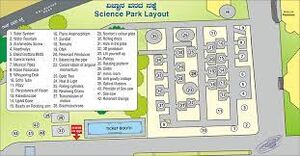Jawaharalal Nehru Planetorium visit
Objectives:
To provide an opportunity for students to explore the application of scientific principles in real-life situation
To help students understand complex scientific concepts through interactive exhibits and demonstrations.
To help children develop interest and curiosity towards science learning
To effectively engage students in the process of learning by providing direct experience to children with concrete phenomena, materials, illustrations and visualizations.
To develop observational skills among students
Exhibition hall
The thematic exhibitions comprise the shows running in the Sky-theatre. Exhibitions consist of posters small video clips and astro - facts on running message boards.
Children can be asked to observe the poster related to various planets and read interesting facts if they can. Teacher can read some of the interesting facts from Poster and ask them,
- Have you ever heard about such fact? Where and what facts?
- Which information amazed you the most? Why?
A work of art by Mr. Ramamurthy, displays the sun and its retinue of planets suspended from the ceiling. Each planet is created with great care, using different metals to get the natural colour.
- How do you think these planets are different from the ones that are mentioned in your text book?
- How do you think this is different from the planets in actual space?
On several occasions 1-minute capsules are screened to educate lay persons about eclipses, meteor showers and opposition and conjunctions of planets.
A brief discussion on, What does this 1- minute capsule trying to tell you about?
The Gallery has a weighing machine that shows the possible weight of a person on various planets and our Moon. A digital display on an artistically produced poster of the solar system displays the weight. A colourful print out of this along with interesting astronomy facts can be obtained on a token fee.
Before children weigh their weight on other planets ask them,
- Do you think there will be difference in your weight when you weigh it on other planets? Why?
- What do you think your weight will be on Moon? Mars? Jupiter? Why do you say so?
Sky- Theatre
Sky- theatre is the star attraction of Planetarium. It comprises 15 metre hemispherical domes on which projection is made. The centralized, air-conditioned theatre has 210 reclining seats with uni-directional viewing arrangement. Shows include history, anecdotes, science facts, cultural aspects, etc that keeps the visitor engaged with the program. The visuals are accompanied by a matching narration and music. This is achieved through a best in class projection and professional audio systems. Unlike cinema theaters, planetariums world over crave to achieve absolute black backdrop for projecting night sky and the Sky- Theatre at Jawaharlal Nehru Planetarium, Bengaluru does exactly that.
Before watching the show, Let children try to think about or document,
What are some questions that you wish to ask/want to know about related to solar system?
After watching the sky theatre show, children can be asked the following questions,
- Could you find answer to any of your questions related to solar system?
- What were some of your questions, to which you could not find answers?
- What information about solar system in the show, amazed you or made you curious?
Science park
JNP has established a Science Park in its campus with over 40 exhibits. Visitors can use these interactive exhibits to learn science in a joyful manner. Science park, comprising interactive science exhibits including Jantar Mantar models, is extensively used by all the visitors – majority of those being students. Some of the interactive exhibits that the science park consists are listed in the image below:
Ask children to answer the following questions, when working/playing with interactive exhibits.
Which exhibit you liked the most? Why?
Does this exhibit represent any science concept discussed in your textbook? If yes, which concept?
Can you think of your daily life experience wherein you have used/applied this science concept/principle?
Note: Take help from your teacher/facilitator to identify the science concepts behind the working of the interactive exhibits.
- How are these two objects different from one another?
- What clues does this artifact/interactive provide about the topic?
- In what ways do these two objects relate to one another?
- If you could change one thing in this exhibit, what would it be?
- Pretend you are an archaeologist/scientist in the future who is observing this object. What would you be able to conclude about the culture of the past?
- Describe the setting in which you might have found this object.?
- Which object will be of greatest value in a hundred years? Why?
- Which object do toy think will take the most time and effort to produce?
